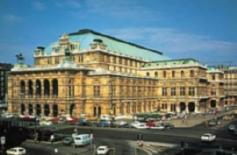Wenkoff was born on August 17th, 1921 in Veliko Tarnovo (click on picture to enlarge).
Veliko Tarnovo (click on picture to enlarge).
He studied at a commercial high school, while helping at his
father's textile business during his free time. When Wenkoff finished, he went to Vienna where he studied world trade at the University.
It is not known when Wenkoff discovered his love for opera, However, one evening of 1942, he is in front of the Staatsoper
where Rigoletto is
being performed that evening. He wanted to attend but how? He asked the concierge to tell the Bulgarian singer Ljubomir Pantscheff
that a young Bulgarian wants
to see him.
Pantscheff is already in costume, when Wenkoff asks him for a free ticket. Pantscheff has already given away his free tickets,
but invites
Wenkoff to visit him the next day.
The next day, Wenkoff tells Pantscheff that he wants to be an opera singer and that he is a tenor.
Pantscheff sits down at the piano and asks Wenkoff to sing. Pantscheff is very surprised as he hears a natural voice
with wonderful high notes.
Pantscheff introduces him to his teacher who encourages him to study. He becomes a student of Marga Wissmann, who
is impressed by his natural singing. From that time on, he spends his free evenings at the Volksoper or Staatsoper,
and studies hard.
After preparing the Nemorino and Rodolfo arias, Marga Wissmann introduces him to Karl Böhm. Böhm is enthusiastic
and begins to prepare the role of Rodolfo with Wenkoff. Without any contract yet, when a tenor due to sing Rodolfo canceled,
Wenkoff
replaced him on January 21st, 1944 at the
 Staatsoper and had great success. The newspaper Wiener Kurier writes:
We have not heard such a fresh, noble and delightful voice in years.
Staatsoper and had great success. The newspaper Wiener Kurier writes:
We have not heard such a fresh, noble and delightful voice in years.
Before the destruction of the theater, Wenkoff sang Rodolfo (3 times), Italienischer Tenor (Capriccio, 3), Stimme des Jünglings
(Frau ohne Schatten, 3),
Malcolm (1), 4. Kapellsänger (Palestrina, 2),
Dandini (Palestrina, 2) and Italienischer Sänger (3), between January 21st and June 24th, 1944
On March 12th, 1945, Wenkoff survives a bombardment that destroys the Staatsoper. On April 12th, 1945 the Red Army enters Vienna.
Wenkoff becomes friend with the Soviet commandants Tolbukhin and Berezovskij and organizes concerts for the Russian,
Bulgarian and American soldiers.
Wenkoff participates at the reopening of the Staatsoper at the Theater an der Wien on May 25th, 1945 as Rodolfo.
His last appearance at the Staatsoper was on April 21st, 1956 as Riccardo, and at the Volksoper in 1957. Since the respective 1945 reopening,
he had sung Riccardo (28 times), Rodolfo (59), Grigorij (2), Italienischer Tenor (Capriccio, 3), Turiddu (27), Don Carlo (2),
Ernesto (12), Johnson (3), Faust (11), Vladimir Igorevich (2), Rinuccio (12), Octavio (Giuditta, 2), Gritsko (7), Števa (3),
François Lorand (Kathrin, 4), Fenton (Die lustigen Weiber von Windsor, 6), Pinkerton (53), Herzog Guido (Nacht in Venedig, 67),
Cassio (33), Duca (21), Italienischer Sänger (6), Graf von Bosco (Schalkhafte Witwe, 8), Cavaradossi (21), Alfredo (34), Manrico (1),
Calaf (2), and Jeník (17).
In 1946, Bulgaria asked him to return for his military service. The director of the Staatsoper intervened, and
he became
an Austrian citizen.
Until 1958, he was also a member of the
Stadttheater in Basel.
He made guest appearances in Graz, in Düsseldorf (1951), Hannover (1953), at the
Teatre del Liceu Barcelona (1955), at the opera in Monte Carlo (1955) and in Italy (e.g. Puritani in Catania
with Maria Callas).
Wenkoff retired early while still having his voice because, according to his brother Spas Wenkoff, of stage fright.
With his spouse, he opened a pharmacy in Vienna. He died on May 12th, 1992.
Reference 1: Peter M. Schneider Heldentenor Spas Wenkoff. Alles war Zufall, Rostock, 2008
Reference 2: Kutsch/Riemens